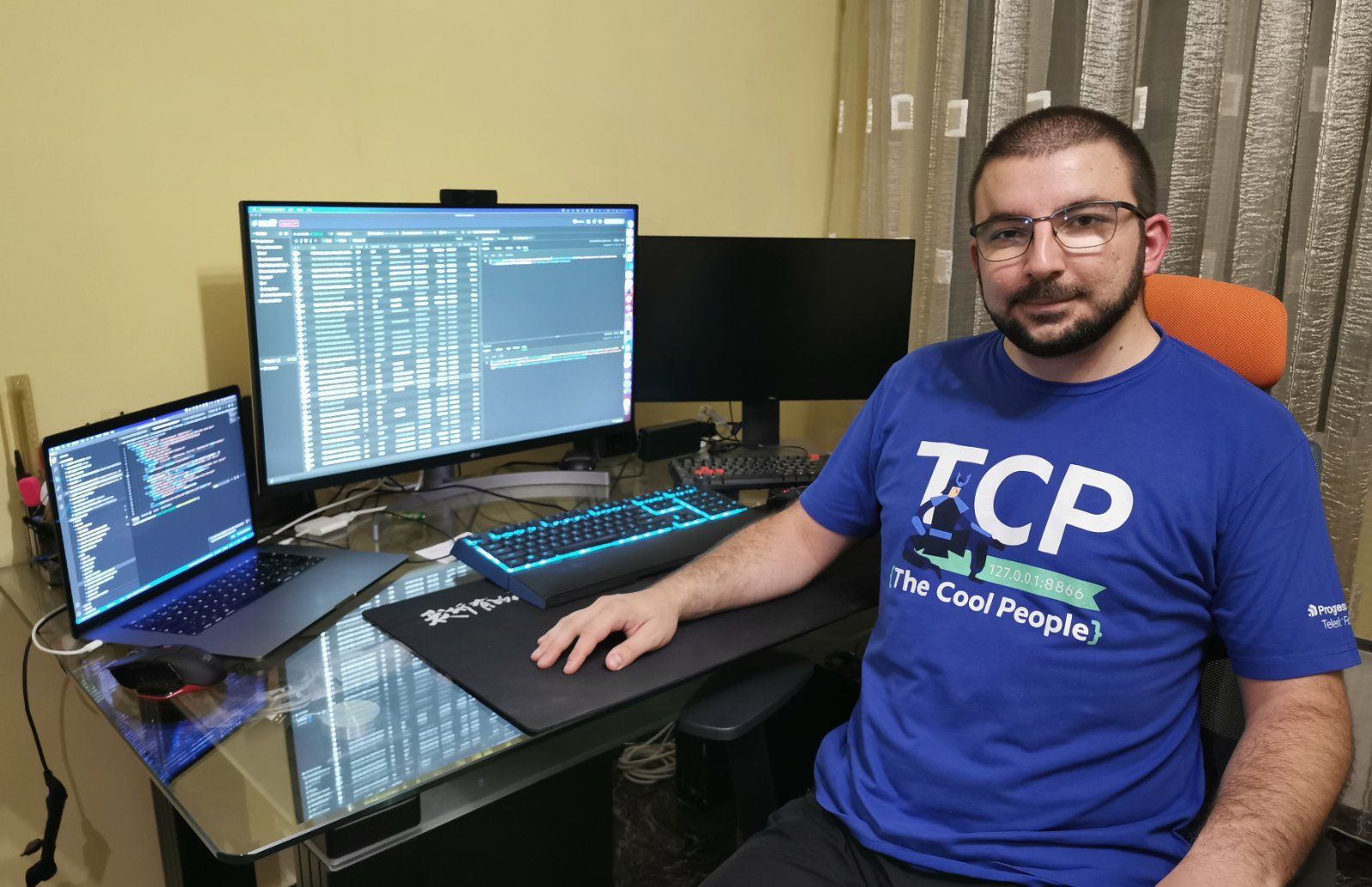Fiddler Team Spotlight: Q&A With Our Manager of Software Engineering

Summarize with AI:
“A software engineer, QA analyst and security expert walks into a bar. What do you want to learn from this one person?”
That spin on the joke you’ve all heard is what the title of this post would have read if I’d had a bit more room.
A few months ago, the Fiddler team was talking about the paths we have taken to get where we are today. It is fun to hear from others their unique journeys, yet what is fascinating is when you realize how multi-faceted many of your colleagues may be.
My next step was finding a willing participant to interview them and talk about why they do what they do, their background and what excites them. The nominations came in rapidly, and I am ecstatic to introduce the winning candidate, Rosen Vladimirov.

Rosen is the Manager of Software Engineering on the Fiddler team, a title he has held for close to two years. Rosen, a self-proclaimed FIFA fanatic, took time out of his schedule to shed light on web debugging proxies, what he looks for when evaluating tools and what he is most excited about to comes to the next release of Fiddler.
What is the first title you had out of the three above, and can you elaborate a little bit on it?
My first official title was software engineer. The exciting thing is that I took classes for programming development in high school, yet I did not enjoy them. Fast-forward a few years, when it was time to go to the university level, I started asking myself, “OK, what am I going to study?” While I considered economics, it was a teacher who shared with me software development programs offered for higher ed, and I gave it more consideration. I was impressed with the curriculum and the opportunities after graduation that were available in this major. That was my start, and the takeaway for others is that it is OK to rethink your path, and even if your first experiences were not ideal, the outcome could be different.
How do you explain to your friends and family what you do for a living?
Let me illustrate how the conversation typically goes. One day my grandfather asked me, “What do you work—what do you do for a living?” And after five minutes of diving into details that were lost on him, I took another approach. We turned on the TV, and here was my explanation, “To have this TV working in such a way that you can change the channels and record programs, there is a professional out there whose job it is to create this experience for you. There is someone behind the scenes, making it possible for you to change the picture that you see here, in the menus and all of those. Similarly, when it comes to software, that is what I do. I’m working to make people’s lives easier through software solutions that allow others to deliver remarkable outcomes and applications.”
Back in the day, when you went to tradeshows and had to work the booth, were you the one out front inviting people into the booth, or were you in the back on the laptop waiting for the super technical questions?
Tradeshows have a special place in my heart. I was the guy standing in front of the booth saying, “Hey, have you heard about us?” For my first conference, I intended to attend 80% of the sessions and spend my remaining time at the booth to partake in conversations. Yet, the booth sucked me in, and I spent 90% of the time at the booth, although I had a complete conference pass.
What has been the best piece of advice you have gotten from a manager that elevated your game?
I feel fortunate that I have had the opportunity to work with many great managers who offered specific advice based on the situation and how to approach it. The one thing along the way that has stood out and that keeps motivating me every single day is to “stay hungry and stay foolish.“ This manager used this mantra on several occasions, and it became ingrained in my mind.
What is the most prominent misconception people have about web debugging proxy tools?
We need to help get the word out to people about how easy it is to capture network data and gather all the information that you need to deliver successful outcomes with the correct tooling. There is a misconception that this task is cumbersome even with the proper tooling, and that is not the case in my experience with Fiddler Classic or Fiddler Everywhere.
Another misconception relates to security concerns with web debugging proxy tools. PSA: Not all tools are created equal, and by selecting the right tool, you can be assured that if your system is secure, then a tool—Fiddler as an example—is secure as well.
When comparing tools, what are the things to pay attention to?
I would start with the problem it solves. Does it solve the problem I have now, and can it grow with me? After that, I would evaluate the products based on their feature value and a big one here is: who is the company backing the product? In many cases, if it is a sole proprietor or a company without a solid record of accomplishment, it can be a risky move with their product. The concern is, I am not sure about when and if they will have release updates and, if I have an issue, what level of support can be expected.
Lastly, I will want a free trial. This allows me to try before I buy and test the support offered during the trial. That is indicative of how the company prioritizes the product and its support capacity.
When it comes to security, what concerns do you hear in the community that you think are important to address to set the record straight?
For me, the biggest misconception about security is that security is a problem. Security is a solution, not a problem. Proper security needs to be viewed as a journey, and it’s a lifelong journey. If you want to be secure, this is something that you need to keep in mind with everything that you do. Yet, rethink how you approach it—it is not a problem. It is a solution to the issues you might face if you do not follow the guidelines and do not follow the best practices.
What is the best professional growth booked you have read or listened to on tape? What was your biggest takeaway?
There are a few, yet to narrow it down, I will go with “Never Split the Difference” by Chris Voss. He worked for the FBI, and, in this book, you learn about the intricate details of the psyche within the human brain. The premise is about negotiating whatever you want to achieve and doing so as if your life depends on it. Through the exploration of conversations, it highlights different approaches you can take to change outcomes. This insight I can apply to my discussions with my team to influence others to create camaraderie.
If you had to pick one web debugging superpower, what would it be?
A super scanning ability. Let me explain: I thrive on a fast and straightforward way to get valuable information. While flight or x-ray vision is more likely in line with what readers of this blog are expecting, I opted to go with something practical. Because today we are all in a situation where we get data from multiple sources even in our daily life through social networks, TV channels and varying types of media. I dream of a day where I can scan all the data and sift through the noise with little effort yet never miss the information that I have decided is important to me.
From your perspective, what are some of the benefits that you see in using a paid product like Fiddler Everywhere versus a free product that is not professionally supported?
For me, hands down, it is their support that is the most important thing. As I mentioned earlier, I will perform tests to determine their responsiveness and knowledge during a trial period. In most cases, I will submit support tickets to see if their answers are to my expectations.
What from the Fiddler Everywhere roadmap published last month gets you the most excited?
All the new features really excite me a lot—there has been so much work during the process of understanding and defining what is important for the users, and the roadmap reflects all those requirements. But still, if I must pick one, it would be the new super powerful Rules Builder.
Conclusion
It has been fun getting to know more about Rosen and presenting to you details about the personalities behind the Fiddler family of products. Once he tells other team members the process of the Q&A was not painful, I expect to have more personnel showcase blogs for you in the future.

Eve Turzillo
Eve Turzillo is a Developer Advocate at Progress, with a passion for all things related to digital experience. For close to 20 years, Eve has been bridging the gap between technologies and community, starting with .NET and now with managed file transfer. Her experience spans various technical ecosystems, yet fostering community engagement and developing initiatives that align with both organizational goals and community needs has always been at the core of what she does.
